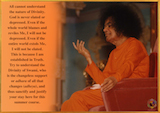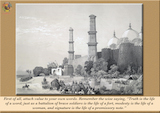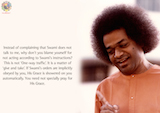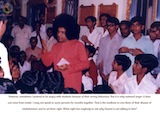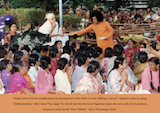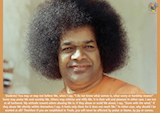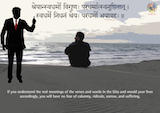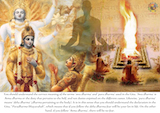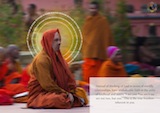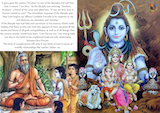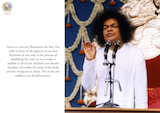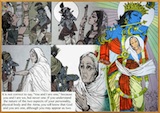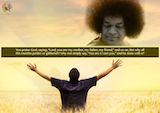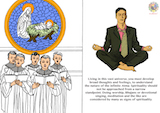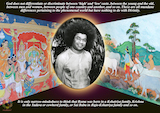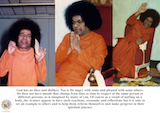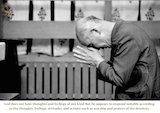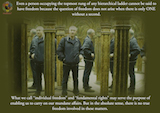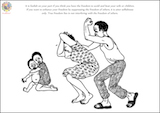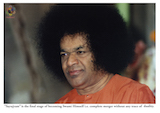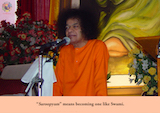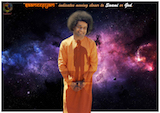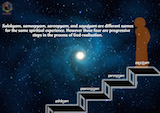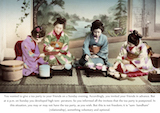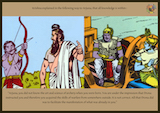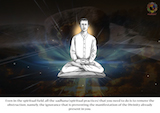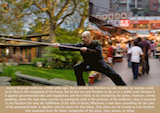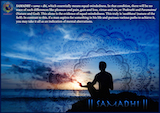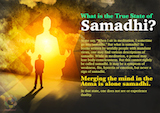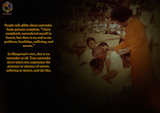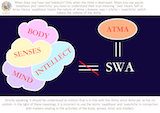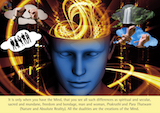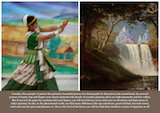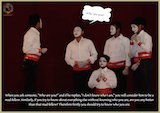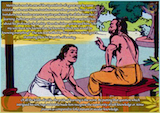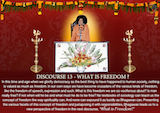|
|
| 'Like' us on Facebook | Follow us: |
Posted on: Dec 25, 2015
SUMMER SHOWERS 1990 ILLUSTRATED (Part 13)
SSI - 26.12.2015 |
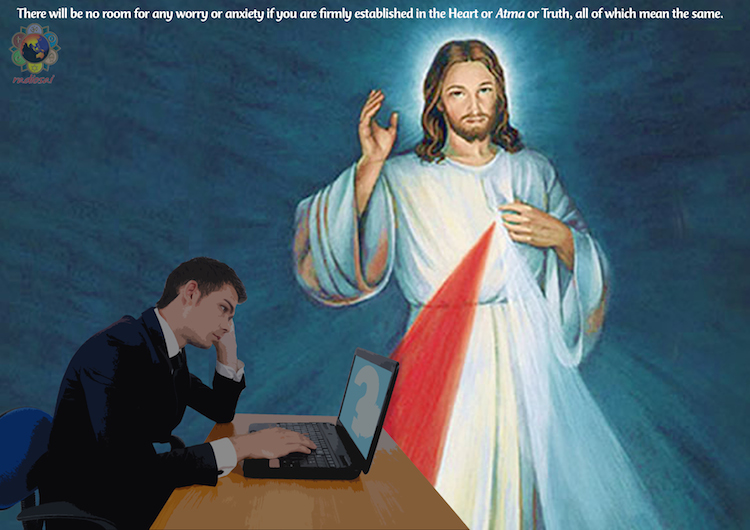 |
Bhagawan would often say, “My life is My Message.” A simple understanding of this declaration is that He lives every day the message He teaches. One other meaning one could draw is that, ‘His message is His life’! That is, the message that Bhagawan gave is the very life essence of His descent as an Avatar. And the fact that even today, we can go through the thousands of discourses He delivered is in itself a sign of His benediction upon us.
And among the discourses Baba delivered, those that He gave as part of the Summer Course series are even more special. This is because often these are a set of discourses centered around a specific theme, elaborated gradually. These are a treasure mine for any sincere spiritual seeker. So in our attempt to encourage more people to dwell deeply into these divine discourses, and contemplate on the message therein, we begin with prayers, a new series today.
In March 2013, with the same motive in mind we began a radio series entitled Shravanam Mananam Nididhyasanam. In this live show we began going through the 1990 Summer Course discourses, and needless to say we were overwhelmed by their profundity. So we now wish to offer these discourses to our readers, in this new format. We will try to pictorially depict the messages in these discourses in the form of a poster. These will be sent everyday to all our Sai Inspires subscribers as a link along with the Thought for the Day (If you are not a subscriber yet, please do subscribe). And after these posters are dispatched, they will be added to this page, on the right hand side. You can view, download and even print and use them if you so wish. Also given below is an abridged version of the discourse as published in the Summer Showers 1990 book.
We pray to Bhagawan to bless and guide this new endeavour of ours. And we invite you all to partake of and imbibe our Master’s ethereal message.
WHAT IS FREEDOM? How glittering and quivering is the waterdrop on the lotus leaf!
Dear Students! If one is allowed to express one’s feelings and thoughts from a public platform without any let or hindrance, it is said to be freedom for the individual. But the truth is that no one has absolute freedom in this universe. The word freedom has been used freely and frequently in the political field. What is freedom? To get rid of foreign rule and to establish the rule of the natives of the nation was considered as freedom before India got her political independence. But that was neither individual freedom nor fundamental freedom. It was only a replacement of foreign rule by indigenous rule, with little or no change in the aspect of freedom as such. After the departure of the foreigners, we thought that the natives got their freedom. But in what aspect did we get freedom? What is the use of simply repeating “freedom”, “freedom”. It is only when we have achieved unity that we can claim to have attained freedom. Without achieving unity, if we talk of freedom, it is merely the freedom of words but not the freedom of the individuals. True freedom springs forth from the level of the heart. What is meant by the heart? Not the physical heart full of flesh and blood. The real
heart is that which has no connection with any particular place, time, individual or country.
It is the divine principle, which is equally present in all persons at all times, in all
places, and in all countries. This heart has no form. What we consider as the heart inside
the human body comes in the middle and goes in the middle. But what we call as heart in
the spiritual parlance knows no coming or going. It is eternal and changeless. Therefore,
true freedom consists in recognising and realising this heart or divine Principle, knowing
which, one becomes the knower of everything.
When you ask someone, “Who are you?” and if he replies, “I don’t know who I am,” what will you think of him? You will consider him to be a mad fellow. Similarly, if you try to know about everything else without knowing who you are, are you any better than that mad fellow? Therefore, first of all, you should try to know who you are. You may say, “I am Ramaiah,” but Ramaiah is the name given to your body. But who is that “I” in your reply, who is separate from Ramaiah? You should understand the nature of that “I”. That “I” is nothing other than the “hridayam” or the heart. That “I” is the Atma or Self. That “I” is Brahman or the Supreme Reality. This heart is All-pervasive or Omnipresent. Consider this illustration: A painter has painted a beautiful picture of a dancing girl on a sheet of paper. The picture shows her body and limbs with several bends and curves, ups and downs in the process of dancing. In another painting, there are high mountains and low valleys. But if you feel the paper by touching with your fingers, you will not find actually any ups and downs or elevations and depressions in either painting. So also, in the phenomenal world, you find many differences like ups and downs, good and bad, sins and virtues, truth and untruth, pain and pleasure etc. But at the level of the heart, you will not at all find these dualities or pairs of opposites. Let us consider another example. Here is a tumbler. It has a name and a form. If you remove or ignore the name and form, what remains? Only silver. It was silver before becoming a tumbler. When it has the form of a tumbler also, it is only silver. If the tumbler is destroyed and made into a round mass, it will continue to be silver only. So it is nothing but silver in the beginning, the middle and the end. The name and form of tumbler were there only in the middle, but neither in the beginning or at the end. That which does not exist in the beginning and the end but exists only in the middle is considered to be really non-existent even in the middle also. Its apparent existence in the middle is only a myth or illusion. That is why the phenomenal world is called mithya jagath (illusory universe.) Ekam Sath (Existence is One). When there is no second, how can the question of freedom or bondage arise? So these concepts of freedom and bondage are the concoctions of your own mind. We give attention and value to the moon, only when there is no sun. Why do we give value to the moon when there is no sun? The moon has no effulgence of its own. It shines only due to the reflection of the sun’s rays. Similarly, when we do not see the sun of Self, we give value to the moon of the mind. The Vedas have revealed that the mind is a reflection of the moon. Therefore we cherish the mind and nourish it by devoting more and more time and attention to it, as long as we do not engage ourselves in Atma vichara or Self-enquiry. It is only when you have the mind, that you see all such differences as spiritual and secular, sacred and mundane, freedom and bondage, man and woman, Prakruthi and Para Thathwam, Nature and Absolute Reality. All the dualities are the creations of the mind. I wish to clarify some points relating to the debate that took place here on the subject of freedom and bondage. Suppose a man is suffering from dire poverty. He is very hungry. Even in spite of begging no one gives him food. Then he feels that he has the freedom to resort to stealing, in order to appease his hunger. Although he may rationalise thus, because of his selfishness, his conscience does not approve his stealing. So how can it be called freedom, when it is disapproved by his conscience? It may, at best, be called freedom with bondage. When does one have real freedom? Only when the mind is destroyed. When you use words “swabhava” and “swechcha,” you have to understand their true meaning. “Swa” means Self or Atma. Hence “swabhava” means the nature of Atma. Likewise, swa + ichcha = “swechcha”, which means the volition of the Atma. Strictly speaking, it should be understood as volition that is in line with the Atma, since Atma per se has no volition. In the light of these meanings, it is incorrect to use the terms “swabhava” and “swechcha” in connection with matters relating to the activities of the body, senses, mind, and intellect. It should be recognised that man’s life is regulated by the laws of nature on the one hand and by man-made rules and regulations on the other. Such being the case, there is no validity in everyone thinking for himself that he has freedom to act as he likes. It is only God that may be said to have freedom. Even this is a relative truth, because in absolute terms, Existence is only one, so the word “freedom” is out of place in this context. People talk glibly about surrender. Some persons complain, “I have completely surrendered
myself to Swami, but there is no end to my problems, hardships, suffering, and
sorrow.” In My view, this is no surrender at all. True surrender never takes into cognisance
the presence or absence of sorrow, suffering or misery, and the like. There are
some others who say, “When I sit in meditation, I sometime go into samadhi.” But what
is samadhi? In books written by worldly people with mundane views, one may find various
descriptions of samadhi. While in meditation, a person may lose body-consciousness.
But this cannot rightly be called samadhi. It may be a symptom of weakness, fits, hysteria
or emotion, but never a sign of samadhi. Merging the mind in the Atma is alone samadhi.
In that state, one does not see or experience duality. samadhi = sama + dhi, which essentially
means equal-mindedness. In that condition, there will be no trace of such differences
like pleasure and pain, gain and loss, virtue and sin, or “Prakruthi and Paramatma”
(Nature and God). This alone is the evidence of equal-mindedness. This truly is “swabhava”
(nature of the Self). In contrast to this, if a man aspires for something in his life
and pursues various paths to achieve it, you may take it all as an indication of mental aberrations.
The highly talented persons in different walks of life have not acquired their skills
from somewhere outside. All these are but manifestations of their own innate potentialities.
It is sheer ignorance to think that any person can be developed by some other person.
Everything is in you alone. All that you do by way of your effort is to manifest or give an
outer expression to what is already inherent in you. So, even in the spiritual field, all the
sadhana that you need to do is to remove the obstruction, namely, the ignorance that is
preventing the manifestation of the divinity already present in you. Krishna too taught
this very truth to Arjuna as follows: In Vedantic parlance, the human body is also called “tunga-bhadra”. Tunga means
very high, vast, great etc. Bhadra means good, sacred, auspicious, effulgent, etc. The implication
of calling the human body “tunga-bhadra is that it is intended to undertake such
noble activities as will bring about the welfare of the society. Therefore, to be worthy of
this name, you should dedicate your body and mind to the loving service of all beings. In
this context, you must remember the shining example of the great musician, Saint Thyagaraja,
who proved himself worthy of his name, which literally means the “King of renunciation”.
When the ruler of Tanjavur sent him a number of precious jewels and provisions
necessary to run a household, he refused to accept them and sang extempore, addressing
his mind thus, “Oh my dear mind! What is it that gives real happiness, wealth or
the Lotus Feet of the Lord? Please tell me the truth.” Then he also sang a prayer to the
Lord as follows, “Oh my beloved Lord Rama! Do you want to tempt me with these
riches, and make it an excuse for deserting me? I have held fast your Lotus Feet with both
my hands. How can these hands now leave your sacred feet, which are my permanent and
precious treasure, in order to receive this transient tinsel of tempting wealth?” Therefore,
just like Thyagaraja who proved himself worthy of his name, you should also prove yourself
worthy of the name “tunga-bhadra”, which the scriptures have given to the human
body. Thirdly “kartavyam”. Due to some reasons, a quarrel arises between you and your wife. In a fit of anger you beat your wife. She goes away into the bedroom and lies down, weeping in agony. She does not attend to cooking. You are sitting in the drawing room. You are extremely angry on two accounts: firstly for the reason that led to your quarrel and secondly because your wife has not cooked food and you are very hungry. So, due to the combination of both anger and hunger, you are very restless. Just then, a good friend of yours comes to visit you. You greet him with a smile, saying “hallo, hallo” and after offering him a seat, you go inside and tell your wife in a hushed voice but with an angry tone, “My friend has come; prepare coffee.” You show an angry face to your wife but a happy countenance to your friend. You don’t want your friend to know that you are angry with your wife, nor do you want your wife to know that you are jolly with your friend. Since you are thus obliged to adjust your behaviour to suit different persons and situations, in conformity with the social norms and etiquette, it is called kartavyam or obligation. Nowadays, people in general, have given the go-by to all the three—sambandham, nirbandham and kartavyam (relationship, compulsion, and obligation). Hence there is “dharmaglani” (an all round decline of righteousness in the modern society). It should be noted that there is no freedom for man in acting according to “relationship, compulsion, and obligation” as illustrated above. There is freedom only at the level of the Atma or Self. Engage yourself in any activity, but always keep in view your true nature as the Self or Atma. If you do so, you will surely enjoy real freedom. There are not two kinds of freedom—individual and spiritual. “Adhi atmikam” or spirituality alone is “swatantryam” or freedom. Freedom alone is spirituality. It is not possible for these two to exist separately. There is only one entity that has assumed different names and forms. Just as the same milk assumes the different names and forms of curd or yoghurt, buttermilk, cream, butter, etc. Similarly saalokyam, saameepyam, saroopyam, and sayujyam are different names for the same spiritual experience. These four, however, are progressive steps in the process of God-realisation. “Saalokyam” means always thinking of God and living in the spiritual world or God’s world, so to say, as against the material world. “Saameepyam” indicates moving closer to Swami or God. “Saroopyam” means becoming one like Swami. “Sayujyam” is the final stage of becoming Swami Himself i.e. complete merger without any trace of duality. If anyone in this phenomenal world says he is having freedom, we can call it only “verri swatantryam” or crazy freedom. It may also be called “ahamkara swatantryam” i.e. freedom of the ego, and “abhimana swatantrayam,” i.e., freedom of infatuation or attachment. It is foolish on your part if you think you have the freedom to scold and beat your wife or children. If you want to enhance your freedom by suppressing the freedom of others, it is utter selfishness only. True freedom lies in not interfering with the freedom of others. You do not find such freedom in this world. What you find in this world is a hierarchy of controls, the one at a higher level controlling the one at a lower level. This results in lack of freedom for all except perhaps for the one top-most person in the hierarchy. But, strictly speaking, even this one person occupying the top-most rung of the hierarchical ladder cannot be said to have freedom because the question of freedom does not arise when there is only one without a second. What we call “individual freedom” and “fundamental rights” may serve the purpose of enabling us to carry on our mundane affairs. But in the absolute sense, there is no true freedom involved in these matters. From the above discussion, we arrive at the conclusion that, from whatever angle we may consider the matter, there is no freedom for man and there can be no freedom for man. In fact, man does not know what true freedom means. One who has freedom does not take birth in this world. One who enters the world with a body, cannot have freedom. Jayamma gave you the example of an animal tied to a peg or stake with a rope of ten feet length to illustrate that the animal has a limited freedom within a diameter of ten feet. But how can you speak of freedom when the animal is tied by a rope to the stake at one end and to its neck at the other end, and when it cannot go beyond ten feet? Anything that is bound by any limitation whatsoever cannot and should not be said to have freedom. This only shows that we are in the habit of using words without knowing their correct meaning. If you understand the true meaning of the “heart”, you will recognise that it is beyond all limitations. The same heart that is within you is also within all others including even those who are hated by you or who hate you. You may have the doubt that if all have the same heart, why should their thoughts, attitudes, and actions be different. Students! Remember that all these differences are created by the mind, and they have nothing to do with the heart. This is not the physical heart but the spiritual heart, which is omnipresent. It has no form, but it is the substratum for all forms, just as sugar is the common basis for all kinds of sugar dolls of different animals, which are liked by different children. All the differences you find in the world are only reflections of your mind. Whether you love someone or hate someone or ridicule someone, they are all only your reflections. If you gave up these “reactions, resounds, and reflections” of your mind, which appear to you in the phenomenal world, and get hold of the Heart called Reality, then all these differences in thoughts, feelings, action; etc. would disappear. God does not have thoughts and feelings of any kind. But He appears to respond suitably according to the thoughts, feelings, attitudes, and actions like worship, prayer, etc., of the devotees. He has no likes and dislikes. Nor is He angry with some and pleased with some others. He does not have moods that change from time to time in respect of the same person or different persons, as is imagined by many of you. Of course, as a result of putting on a body, the Avatars also appear to have such reactions, resounds, and reflections but it is only to set an example to others and to help them to reform themselves, so that they may make the needed progress in their spiritual journey. God does not differentiate or discriminate between “high” caste and “low” caste, between the young and the old, between men and women, between people of one country and another etc., etc. These are all mundane differences pertaining to the phenomenal world but have nothing to do with Divinity. It is only narrow-mindedness to think that Rama was born in a Kshatriya family, Krishna in the Yadava or cowherd family, or Sai Baba in Raju-Kshatriya family and so on. God will never have such differences. If one understands rightly the nature of the divine principle of the Atma, there will be no scope for such petty, narrow-minded differences and discriminations. Living in this vast universe, you must develop broad thoughts and feelings, to understand the nature of the infinite Atma. Spirituality should not be approached from a narrow standpoint. Doing worship, Bhajans or devotional singing, meditation and the like are considered by many as signs of spirituality. But all these are only mental aberrations, and serve to give only mental satisfaction to the practitioners. You praise God, saying, “Lord, you are my mother, my father, my friend,” and so on. But why all this mumbo-jumbo or gibberish? Why not simply say, “You are I; I am you,” and be done with it? In this connection, it is not correct to say, “You and I are one,” because you and I are we, but never one. It is better to say, “We and we are one,” because I am in you and you are in Me. Therefore, when we come together, we become one. However in the statement: “We and we are one,” there is duality, because the “we” consists of the physical body and the divine principle of the Atma. If you understand the nature of these two aspects of your personality, you will not think of the relationships like mother, father, friend, etc. between yourself and God. You are both one, although you may appear as two. Here is a concrete illustration for this. The mike in front of Me appears as two but functions as one only in the process of amplifying my voice so as to make it audible to all of you. Similarly you should visualise and realise the unity of the body and the Hridayam or Atma. This is the one sadhana you should practice. Students! Spirituality means merger with God. You are not different from God. You are God, God is you. If you are firmly established in this faith, you need not undertake any other sadhana or spiritual practices. Of course, some people repeat parrot-like, “I and you are one,” but they do not live up to it. Here is a small story to illustrate this. A guru gave the mantra “Sivoham” to one of his disciples and told him that the mantra means “I am Siva.” As the disciple was uttering, “Sivoham, Sivoham,” a friend of his came and asked him about the meaning of the mantra, the friend questioned him, “If you are Siva, how is Parvathi related to you?” The immediate response of the disciple was: “May God forgive my offence! Goddess Parvathi is far superior to me and deserves my adoration and worship.” The point to be noted here is that if the disciple had real faith and conviction in the mantra, “Sivoham”, which implies that there is only one God who appears to have assumed all the names and forms of all gods and goddesses, as well as of all beings in the entire universe, then the correct answer to his friend’s question would have been, “I am Parvathi too.” Instead of that, this wrong reply was due to his belief in the traditional husband-wife relationship—that Parvathi was Siva’s consort. Therefore, this kind of complications will arise if you think of God in terms of such worldly, physical relationships like mother, father, etc. Instead of that you should have unshakeable faith in the unity of Godhead and assert, I am you, you are I; we are not two, but one.” This is the true freedom inherent in you. In this context you should understand the correct meaning of the terms “swa dharma” and “para dharma” used in the Gita. The meaning of “swa dharma” is Atma dharma, and not the dharma or duties enjoined on the different castes like Brahmana dharma, kshatriya dharma, and so on. Like-wise, “para dharma” means “deha dharma” (dharma pertaining to the body). It is in this sense that you should understand the declaration in the Gita, “Paradharmo bhayavahah”, which in effect means that if you follow the “deha dharma or the dharma of the physical body, fear will be your lot in life. On the other hand, if you follow the “Atma dharma”, there will be no fear for you. If you thus understand the real meanings of the verses and words in the Gita and if you mould your lives accordingly, you will have no fear of calumny, ridicule, sorrow, and suffering. Students! You may or may not believe Me, when I say, “I do not know what sorrow is, what worry is, or what hardship means!” Some may praise Me and worship Me. Others may criticise and vilify Me. It is their will and pleasure in either case. I am not at all bothered. My attitude toward others abusing Me is: if they abuse or scold Me aloud, I say, “Gone with the wind,” if they abuse Me silently within themselves, I say, it hurts only them, for it does not reach me.” In either case, why should I be worried at all? Therefore, if you are established in Truth, you will never be affected by praise or blame, by joy or sorrow. People come to Me and complain about the bereavements in their family or some suffering or pain etc. I respond to them by saying, “Challa santosham,” which means “Very happy.” You should note that this kind of happiness remains the same under all circumstances, because it is based on the “Atma Thathwa”—that is, “Everything is Atma.” However, sometimes I pretend to be angry with students because of their wrong behaviour. But it is only outward anger; it does not come from inside. I may not speak to some persons for months together. That is the medicine to cure them of their disease of misbehaviour and to set them right. What right has anybody to ask why Swami is not talking to him? A small example for this. Four patients come to a doctor. They have all come with the same complaint of stomach ache. The doctor examines them one after the other. He sends one of them away with the advice to have hot water fomentations. For the second patient he gives a mixture of mag sulph and soda bicarb and tells him that he will be relieved of his stomach ache, which is due to gas trouble. For the third person, he gives some tablets. But he wants the fourth person to undergo a surgical operation immediately, because his stomach pain is due to appendicitis. Similarly, I give different treatments to different persons based on their needs and for their own good. I don’t look at all at some people. I don’t speak to some. I avoid or bypass some people although they try to attract my attention. These are all my prescriptions for their respective diseases. Why do I administer such medicines or treatments? I have got principles. My word is very precious. Even if you don’t give value to My word, I attach great importance and value to My word. If somebody does not heed My word, I don’t like to waste My words by speaking to him. Hence in order to save the value of My words, I stop talking to such persons. Instead of complaining that Swami does not talk to me, why don’t you blame yourself for not acting according to Swami’s instructions? This is not “One-way traffic”. It is a matter of “give and take”. If Swami’s orders are implicitly obeyed by you, His Grace is showered on you automatically. You need not specially pray for His Grace. First of all, attach value to your own words. Remember the wise saying, “Truth is the life of a word; a battalion of brave soldiers is the life of a fort, modesty is the life of a woman, and signature is the life of a promissory note or bond.” All cannot understand the nature of Divinity. God is never elated or depressed. Even if the whole world blames and reviles Me, I will not be depressed. Even if the entire world extols Me, I will not be elated. This is because I am established in Truth. There will be no room for any worry or anxiety if you are firmly established in the Heart or Atma or Truth,—all of which mean the same. Try to understand the divinity of Swami, who is the changeless support or adhara of all that changes (adheya), and thus sanctify and justify your stay here for this summer course.
|
|
- Team Radio Sai
What do you think about this series? Please let us know by writing in to h2h@radiosai.org. Do not forget to mention your name and country.



